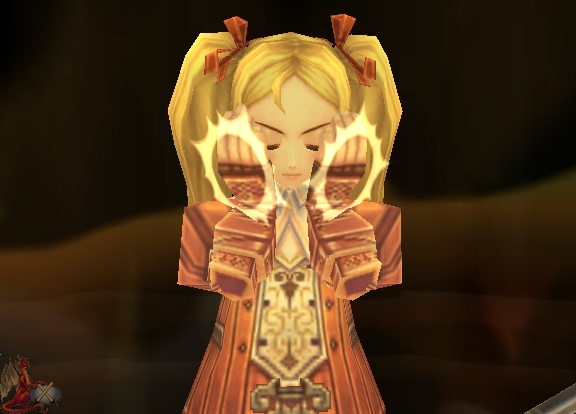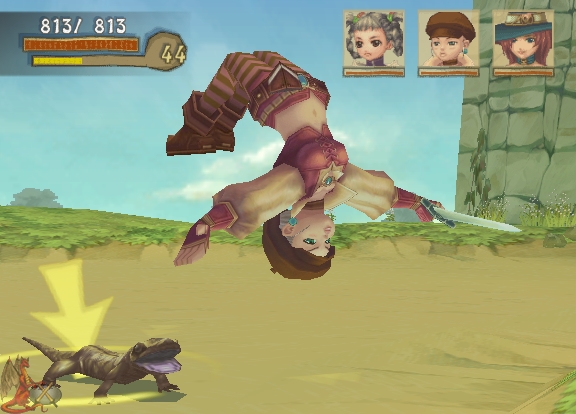|
|

|
BATTLE SYSTEM
|

|
INTERACTION
|

|
ORIGINALITY
|

|
STORY
|

|
MUSIC & SOUND
|

|
VISUALS
|

|
CHALLENGE
|
Easy |
COMPLETION TIME
|
20 to 80 hours
|
|
OVERALL
4.0/5
|
Rating definitions
|
|
|
Meet Jack Russell. He's a whiny, somewhat dull kid who rides on the tails of his father's greatness. He enjoys kicking everything in sight just to watch it shake. People are not excluded from this foible, and those who object are met with a drawn sword. Jack skirts responsibility and has a tendency to get in deep trouble with his superiors. He has no worldly knowledge, but that doesn't stop him from informing everyone of his opinion. In short, Jack could accurately be called a "slacker" by Mr. Strickland.
Oh yes. Jack is also the last hope for world of Radiata Stories.
Radiata Stories is an intriguing entry into the RPG genre, an enigmatic aggregation that defies simple elucidation. It brings together elements from numerous, diverse games without simply becoming a patchwork nightmare. Veteran RPGamers will easily see the influence of some favorites (Suikoden, Star Ocean, Kingdom Hearts, Fable), but this conglomeration is sometimes confused about itself and the nature of the story it is attempting to tell.
 She forgot to yell "CLEAR!"
She forgot to yell "CLEAR!"
|
|
Radiata Stories's story concerns Jack's (mis)adventures with the Radiata Knights and the surrounding fairy kingdoms. The tone throughout is as highly irreverent as Jack himself; it's not quite on the level of Disgaea or The Bard's Tale, but it certainly will strike many as humorous. While often amusing, this tone does seem out of place when the story takes a rather serious turn in the latter half of the game.
Battles are instanced real-time with the player only controlling Jack. The battle system is surprisingly simple, sometimes infuriatingly so. Jack has a standard attack, a strong attack which uses Volty Points, and a freeze-time-so-he-can-pull-off-a-massive-ultimate-move attack which wipes out a full Volty Point gauge. Volty Points are a collective meter which increases for every successful hit but is reduced if the party is hit while in link mode. Link mode is only available if Jack is the party leader; this mode allows for the usage of attack formations and the sharing of skills.
While that may sound reasonably complex, most battles will simply be Jack running around attacking everything while the other AI-controlled characters run around doing very little. It seems limiting that Jack has no access to any sort of magic/techs, and while he can give orders to party members, he cannot directly command them or set any overarching tactics.
Enemies in battle do not display any kind of health gauge, so unless a disposable item is used, players must simply hack away in hopes that the enemy will eventually die. Oddly enough, enemies can ambush Jack et al, resulting in a confusion status at the outset, but Jack cannot do the same, even when kicking enemies awake.
Jack and his companions can also have a single skill equipped. Jack can learn dozens of skills over the course of the game, but he can only use one at a time. Four types of weapons exist as do a small number of armors; Jack's appearance is reflective of what he is currently equipped with.
Perhaps the strongest aspect of the gameplay is the immersive environment that Tri-Ace has created. Much of Jack's time will be spent in the city of Radiata, a city that breathes a breath of life not often seen in gaming. Most RPGs only give names to important characters, but nearly everyone, save for a few guardsmen, who Jack meets is not only named but is possibly recruitable.
During Jack's journey, he can recruit over 175 characters to join his cause. Every character has their own personality and routine during the day/night cycle. Finding out what will make the character join will either be a pleasure for those willing to thoroughly explore their environments or a complete nightmare for those seeking quick cannon fodder. Recruitment requirements range from a simple conversation to seeking out a rare flower to recruiting dozens of other characters and then trying desperately to win a boss-level fight.
Time cycles in Radiata at the rate of about one real minute to one game hour. Characters have individual routines according to their personalities. Many have jobs during the day and retire to their houses at night. But when night falls, the shadier elements come out to play. Characters will have different conversations depending on the time of day, story events, or even based on current party members. Few other RPGs provide such a varied and immersive environment.
Despite these strengths, Radiata Stories does have its share of weaknesses. The most glaring of these is the lack of save points. In fact, for much of the game, there is but a single save point; temporary save points pop up during specific missions, but these are not plentiful. Don't expect to be able to save right before boss fights. Or right after boss fights for that matter.
 Battle pose only recommended
for gypsies or flying squirrels.
Battle pose only recommended
for gypsies or flying squirrels. |
|
To make matters worse, that one save point is often a trigger for moving the story forward. Since the storyline itself is fairly short, players only have a limited amount of time to do side missions or recruit characters during specific time frames.
Coupled with that is the limited ability to move time forward. The only means for significantly moving the clock at a fast rate is to sleep in Jack's bed. Unfortunately, Jack's bed is right next to the save point, and sleeping itself is often a trigger a for moving the story forward. No matter what time Jack goes to bed, he always wakes up in the early hours of the morning; this does not do much for a player trying to skip ahead to the middle of the night.
The result of these two foibles is that completionists will spend a significant amount of time simply waiting for time to move forward naturally without trying to save progress until they absolutely have to. At a rate of 24 minutes to a game day, this does not make for much excitement, and losing several hours of gameplay due to a bad encounter is rather frustrating.
Another shortcoming is that the map system could have used a good revamping; Radiata Castle is a maze of corridors, independent staircases, and rooms that make navigation as painful an experience as driving with someone who refuses to acknowledge they they're lost despite the fact no civilization has been seen for hours. The city of Radiata comes with a fairly good map, but many somewhat hidden locations are not marked. While this does encourage exploration, it would have been nice to have had an updated map so one does not have to remember which particular shop is which when there are dozens to check.
Visually, Radiata Stories features a highly detailed environment that is varied and beautiful. Character designs tend to be unique and interesting, and cinematics are a very close representation of the game engine. In a bold move, when Jack is blinded, the screen itself pixelizes, representing too well the difficulty of attacking while blind. Scrutinous players should look for a number of visual gags, including several suggestive ones.
Aurally, the game's soundtrack is varied and catchy, featuring noticeably different audio tracks dependent on one's location. Voice acting is also top-notch.
Radiata Stories features two distinct story paths, each with unique recruits, so players looking to get the most out of the game will need to have at least two playthroughs. Tri-Ace continues its tradition of having a post-game bonus dungeon, and some items do carry over into a new game+. The storyline itself is around twenty hours, but potential exploration easily balloons game time. All things considered, Radiata Stories comes recommended.
Review Archives
|









